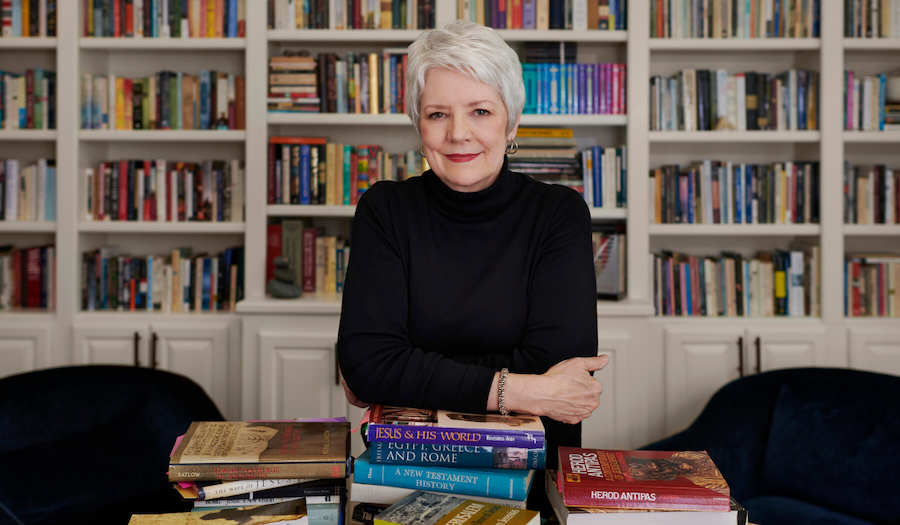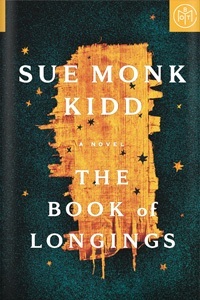Bestselling Author Sue Monk Kidd Hopes Her New Book Will Open a Portal to the Common Heart

In her latest work of fiction “The Book of Longings,” Sue Monk Kidd takes an audacious approach to history and brings her acclaimed narrative gifts to imagine the story of a young woman named Ana and her marriage to a young Jesus. Grounded in meticulous research and written with a reverential approach to Jesus’s life that focuses on his humanity, The Book of Longings is being described as an inspiring account of one woman’s bold struggle to realize the passion and potential inside her, while living in a time, place and culture devised to silence her.
1. Your book is described as an “audacious approach” to history about the marriage of Jesus to a “rebellious” woman named Ana. What was your inspiration behind this story? Tell us about Ana?
The idea to write a novel about the fictional wife of Jesus struck me one day as I was reading an article in National Geographic about a fragment of an ancient manuscript named the “Gospel of Jesus’ Wife,” in which Jesus spoke of “my wife.” The fragment turned out to be a masterful forgery but that was irrelevant compared to the way my imagination was ignited. Within minutes I’d give this unknown wife a name—Ana. It occurred to me that if she’d ever actually existed, she would be the most silenced women in western history. So, for the next four-and-a-half years I tried to give her a voice.
When the novel opens, Ana is 14 and doing everything she can to avoid becoming betrothed to an older widower who repels her. She belongs to a wealthy family which has ties to the ruler of Galilee. Exceptionally bright, gifted, daring, and ambitious, she longs to become a scribe and write narratives, especially the lost, forgotten stories of women. She wants to bring forth the “largeness” in herself. She wants the freedom to be a voice and to leave her voice in the world. She says, “To be ignored, to be forgotten, this was the worst sadness of all.”
2. The idea of a married Jesus goes against centuries of dogma and tradition. Did you feel any trepidation about writing a novel with this premise? How did you approach writing the character of Jesus?
I didn’t take on writing about a married Jesus lightly. I knew that for readers, imagining a married Jesus could mean digging through some internal resistance: the fear, perhaps, of stepping outside of sanctioned beliefs or questioning religious authority. As my husband said when I announced the premise to him, “You’re going to write a novel in which Jesus gets married? What could possibly go wrong?” Yes, I suppose there could be some controversy, but it felt important to me to imagine this wife, this missing feminine. Of course, I don’t know if Jesus married or not, but believing it wasn’t the point. Imagining it was. Reimagining the past might allow us to re-envision the present.
My approach was to portray Jesus as fully human, to depict what the late historical Jesus scholar Marcus Borg called “the pre-Easter Jesus.” The church considers Jesus both fully human and fully divine, but over the centuries his humanity was overshadowed by his divinity. I wanted to write about the human Jesus and what an extraordinary human being he was.
3. The relationship you created between Ana and Jesus is described as one of love and conflict. How did you envision and create their relationship?
Three particular things come to me.
It felt important to portray the humanness in their marriage. That meant allowing it to have tensions and conflicts. Most of them came about because of the contrast between his freedom and her limitations placed on her as a woman.
I wanted Ana to be a real partner to Jesus, for the two of them to learn from each another. For that to happen, she needed to have her own magnitude, passion and quest. It was this need that resulted in her being something of a prodigy in her own right. In fact I should probably say that while Jesus is an important character, this is Ana’s story.
I also wished for their relationship to be one of uncommon love, a marriage of gladness and aliveness.
4. You did a lot of research for this book. How did you go about it? Did you uncover anything especially impactful or surprising?
The research was downright daunting. There was so much of it that at times I wondered what I’d gotten myself into. Mostly though, I found it captivating. I read what seemed like a tiny library. I filled notebooks with my scribbles. I created story boards, watched documentaries and video lectures. After 14 months of this, I had to force myself to stop researching and start writing.
One of the most impactful discoveries I made was the existence of incantation bowls. I came across one on the internet and as I gazed at it, the opening scene of the novel fell into place. What enthralled me about the bowl was that over 2000 years ago, a prayer had been inscribed inside it in spiraling fashion. In the story, Ana receives such a bowl and writes her longing in it: “Bless the largeness in me no matter how I fear it.”
5. What do you hope readers will learn from this book?
I definitely hope readers find the novel enlightening and learn something they didn’t know before, but I’ll tell you what I most want. I want the reader to have an empathetic experience with the characters. To feel what it’s like, for instance, to be silenced, marginalized, and left behind, what it’s like to live into our largeness, to follow our longings, or find our bravery.
There’s a phrase I love that comes from Ralph Waldo Emerson. It’s called the common heart. Emerson suggested it was a place inside where we share an intrinsic unity with all humanity. I can think of nothing I would like more than for “The Book of Longings” to be a portal into the common heart.

To order your copy of “The Book of Longings,” click here.
This Q&A was featured in the May 10th edition of The Sunday Paper. The Sunday Paper inspires hearts and minds to rise above the noise. To get The Sunday Paper delivered to your inbox each Sunday morning for free, click here to subscribe.

